从英国人言行规则理解和区别某些英语表达法论文
中英文表达上的差异

中英文表达上的差异一、思维方式的文化差异英汉文化差异在思维方式中也有明显地反映。
英语文化注重细节分析和对个体成分独立作用。
因而,英语句子注重形式联系,注重结构的完整形式和逻辑性。
汉语的思维方式是和中国人在哲学上注重体验、感悟密切相关,在艺术上主张神似密不可分的。
汉语句法不受形态成分的约束,词语的组合非常灵活,不拘于形式,注重意合。
英汉在思维方式的方面差异也反映在英语与汉语的篇章结构中。
英美人写文章一般都直截了当、开门见山。
英语段落也呈线性式,或者是直线式发展的,一般都有主题章节、段落或主题句,先提出论点,然后对一些支持性的材料进行阐述说明。
汉语就有所不同,汉语文章的段落思维方式一般是螺旋型的,围绕着主题由远到近、由表及里地来进行论述,表现出汉语说话委婉、含蓄的思维特点。
曾经有调查表明英汉间的思维差异。
在200个中国人提出的请求中有129个先说明请求理由,后提出请求事项,而在200个英国人提出的请求中,有131人先提出请求事项,再说明理由。
在时间概念上,中国人和英美人在思维方式上有着明显的不同。
守时是英美人最重要的行为规范之一。
在赴宴时,英美人一般是准时到达。
而我们中国人则认为提前几分钟更礼貌。
故事:是“这星期六”还是“下星期六”一次,一个外国学生拜访他的中国老师,老师想请他吃饭,就说:“你下星期六来我家吃饭,好吗?”学生很高兴地接受了邀请,并约好了具体时间。
过了两天,到了星期六,学生来了。
老师感到很意外。
由于毫无准备,老师很尴尬。
幸好跟这个学生很熟,于是就说:“前天我说的是下星期六请你。
你看,今天我什么也没准备……”学生说:“前天你说下星期六请我吃饭,不就是今天吗?”这场误会完全是对“下星期六”的不同理解造成的。
在不少教材中和课堂上,给学生讲“上星期”就是“last week”,“这星期”就是“this week”,“下星期”就是“next week”。
这样讲不能说错,但在实际运用中,如“上星期六”和“下星期六”与英语的“last Saturday”“next Saturday”有时却不是对应的,其区别是英语和汉语观察时间的参照点不同。
英语作文英国礼仪与中国的差异
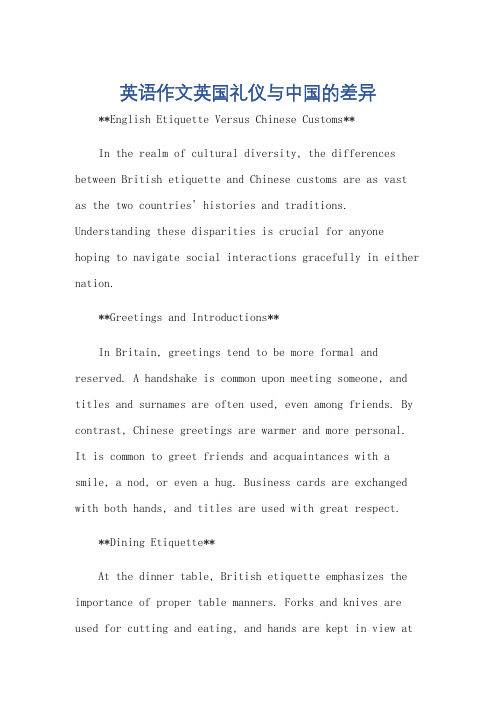
英语作文英国礼仪与中国的差异**English Etiquette Versus Chinese Customs**In the realm of cultural diversity, the differences between British etiquette and Chinese customs are as vast as the two countries' histories and traditions. Understanding these disparities is crucial for anyone hoping to navigate social interactions gracefully in either nation.**Greetings and Introductions**In Britain, greetings tend to be more formal and reserved. A handshake is common upon meeting someone, and titles and surnames are often used, even among friends. By contrast, Chinese greetings are warmer and more personal.It is common to greet friends and acquaintances with a smile, a nod, or even a hug. Business cards are exchanged with both hands, and titles are used with great respect.**Dining Etiquette**At the dinner table, British etiquette emphasizes the importance of proper table manners. Forks and knives are used for cutting and eating, and hands are kept in view atall times. Conversations are usually light and avoid controversial topics. In China, dining is a much moresocial experience. It is common to share dishes and use chopsticks. Hands are often used to gesture and emphasize points during conversation, and topics can range from the lightest of banter to serious discussions.**Gift-Giving**When it comes to gift-giving, British culture tends to be more practical and understated. Gifts are often chosen with care, reflecting the recipient's interests or needs, and are wrapped neatly. By contrast, Chinese gift-giving is more generous and elaborate. Gifts are often wrapped in red paper, symbolizing good luck and prosperity, and are often given with great ceremony and expectation of reciprocation. **Social Gatherings**Social gatherings in Britain are often more structured and planned. Invitations are formal, and RSVPs are expected. Dress codes are often specified, and guests are expected to adhere to them. In China, social gatherings are moreinformal and spontaneous. Invitations are often extended verbally, and guests are expected to arrive a bit early toshow respect. Dress is less formal, and the focus is moreon enjoying the event and making connections.**Conclusion**In conclusion, the differences between Britishetiquette and Chinese customs are numerous and reflect the distinct cultures and values of these two nations. Understanding and respecting these differences is essential for successful cross-cultural communication and interaction. By embracing the unique aspects of each culture, we can foster greater understanding and appreciation among people from diverse backgrounds.**英国礼仪与中国习俗之比较**在英国与中国的文化领域中,两者之间的礼仪和习俗差异犹如两国的历史和传统一样丰富多彩。
探究英国人的言行潜规则

探究英国人的言行潜规则作者:王兰来源:《现代交际》2019年第22期摘要:学习英语语言,必须了解语言背后的文化,培养跨文化交流能力。
研究《新概念英语》文本里隐含的英国文化,揭示英国人惯用冷幽默礼貌地表露不满、掩饰尴尬;节制谨慎、不沉迷美味享受,热衷打理花园、保护隐私、拘谨、不善与陌生人交谈,敏感的阶层意识体现于日常用语和虚伪的谈钱禁忌。
英国文化不仅有别于中国文化,与美国文化也有很大差异。
了解英国人典型的言行潜规则,分清英美文化的异同,有助于在全球化时代顺利实现跨文化交流,建立本国文化自信。
关键词:英国文化言行规则《新概念英语》跨文化交流中国文化自信中图分类号:G642.4; 文献标识码:A; 文章编号:1009—5349(2019)22—0080—02现代社会经济协作全球化,交通通信便捷,互联网普及,跨文化交流活动日益密切。
顺利实现跨文化交流,与不同文化背景的人实施有效适当的交流,需要了解他国文化,比较本国文化。
“任何文化都体现了人们的行为方式、办事规则和共处规范。
”[1]不同语言背后隐藏不同的文化。
语言不仅是交流的工具,还是民族文化的重要载体和组成部分。
文化差异使不同文化背景的人对同一事物的理解不同,并且导致不同的行为,因而有时会引起误解。
[2]跨文化交流不仅仅是语言的交流,更是各国文化的沟通理解。
“文化是调控人的行为模式的知识信念系统,文化知识是可以学习的。
”[3] 学习者在学习语言技能的同时,必须以尊重、开放、包容、好奇的态度,学习其他民族的社交礼仪、行为规范、生活习俗、价值观、社会政治、宗教、历史和地理等文化知识,有意识地观察分析,自觉调整,以实现跨文化交流。
[4]英语学习与相关文化知识的研究,相辅相成,缺一不可。
学界已有不少中西文化比较研究,但是没有专门就具体的教材来对西方人言谈举止背后的文化做研究的,区分研究英国人和美国人的也不多。
《新概念英语》(New Concept English,简称NCE)是享誉全球的英语教材,每年中国的使用者超过数百万。
中国和英国礼仪差异英语作文
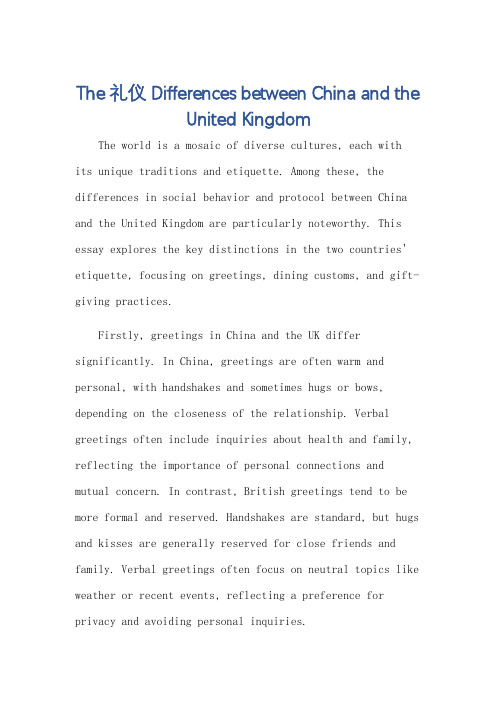
The礼仪Differences between China and theUnited KingdomThe world is a mosaic of diverse cultures, each withits unique traditions and etiquette. Among these, the differences in social behavior and protocol between China and the United Kingdom are particularly noteworthy. This essay explores the key distinctions in the two countries' etiquette, focusing on greetings, dining customs, and gift-giving practices.Firstly, greetings in China and the UK differ significantly. In China, greetings are often warm and personal, with handshakes and sometimes hugs or bows, depending on the closeness of the relationship. Verbal greetings often include inquiries about health and family, reflecting the importance of personal connections and mutual concern. In contrast, British greetings tend to be more formal and reserved. Handshakes are standard, but hugs and kisses are generally reserved for close friends and family. Verbal greetings often focus on neutral topics like weather or recent events, reflecting a preference for privacy and avoiding personal inquiries.Dining customs also vary widely between the two countries. In China, dining is a social event, often centered around a round table where everyone faces each other. The host typically takes the lead in ordering dishes and ensuring that everyone is well fed. Conversation during meals is lively, and it is considered polite to offer food to others. In contrast, British dining culture is more formalized, with a set order of courses and a focus on individual plates. Conversations during meals are more subdued, and it is customary to wait for the host to begin eating before following suit. Offering food to others is less common, reflecting a greater emphasis on personal choice and independence.Gift-giving practices also differ between China and the UK. In China, gift-giving is a significant aspect of social interaction, often reflecting the giver's respect and regard for the recipient. Gifts are often wrapped elaborately and presented with ceremony. It is customary to decline a gift initially as a show of humility, before ultimately accepting it with gratitude. In the UK, gift-giving is more casual and less frequent. Gifts are often simple and practical, and wrapping is less elaborate. It isconsidered polite to accept a gift without much fuss, andit is not uncommon to thank the giver and then put the gift aside without much attention.In conclusion, the differences in etiquette between China and the UK reflect the unique cultural values and social norms of each country. Understanding these differences is crucial for successful cross-cultural communication and interaction. By respecting and adapting to local customs, individuals can foster stronger relationships and avoid misunderstandings in both personal and business settings.**中国和英国礼仪差异**世界是由各种文化组成的马赛克拼图,每种文化都有其独特的传统和礼仪。
中英礼仪差异英语作文
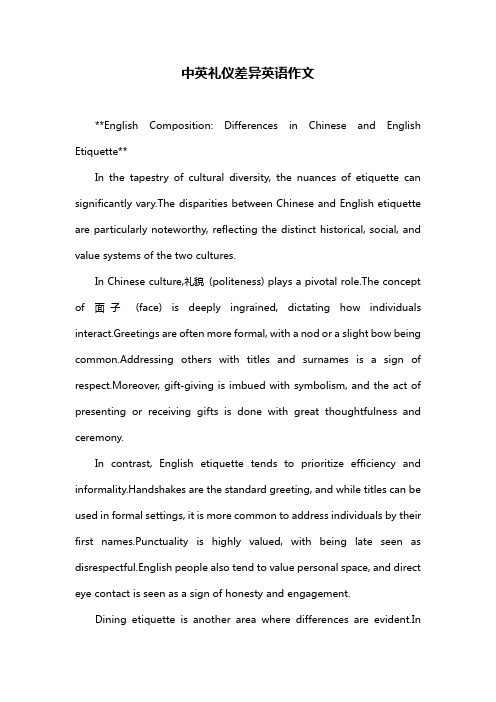
中英礼仪差异英语作文**English Composition: Differences in Chinese and English Etiquette**In the tapestry of cultural diversity, the nuances of etiquette can significantly vary.The disparities between Chinese and English etiquette are particularly noteworthy, reflecting the distinct historical, social, and value systems of the two cultures.In Chinese culture,礼貌(politeness) plays a pivotal role.The concept of 面子(face) is deeply ingrained, dictating how individuals interact.Greetings are often more formal, with a nod or a slight bow being common.Addressing others with titles and surnames is a sign of respect.Moreover, gift-giving is imbued with symbolism, and the act of presenting or receiving gifts is done with great thoughtfulness and ceremony.In contrast, English etiquette tends to prioritize efficiency and informality.Handshakes are the standard greeting, and while titles can be used in formal settings, it is more common to address individuals by their first names.Punctuality is highly valued, with being late seen as disrespectful.English people also tend to value personal space, and direct eye contact is seen as a sign of honesty and engagement.Dining etiquette is another area where differences are evident.InChina, meals are social events where sharing is a cornerstone.It is common to serve others and to sample from a variety of dishes.On the other hand, English dining can be more individualistic, with each person ordering their own food and eating it separately.Ultimately, understanding and respecting these differences in etiquette are crucial for effective cross-cultural communication.It is through such understanding that mutual respect and appreciation can flourish.**中文作文:中英礼仪差异**在丰富多彩的文化多样性中,礼仪的细微差别显著地表现出了不同。
中国英国手势差异英语作文

中国英国手势差异英语作文In the intricate tapestry of nonverbal communication, gestures play a pivotal role, often conveying messages and emotions that words alone cannot express. The differences between Chinese and British gestures, however, can be asvast as the cultures themselves, reflecting distinct values, traditions, and social norms. This essay delves into the disparities in gesture usage between these two cultures, exploring the underlying reasons for these variations and their impact on cross-cultural communication.In China, gestures are often used to emphasize speechor to add a layer of emotional expression. For instance, nodding the head is a common gesture of agreement, but in China, it is often accompanied by a smile or a verbal affirmation to convey sincerity. By contrast, in Britain, nodding the head is often a unilateral action, with less emphasis on additional expressions of agreement. This difference reflects the Chinese tendency towards a more collective, harmonious communication style versus theBritish preference for a more direct, individualistic approach.Another significant difference lies in the use of hand gestures. In China, raised hands or waving motions are often used to indicate a greeting or farewell, with the palms facing towards the recipient. This gesture is interpreted as a sign of respect and warmth. In contrast,in Britain, raised hands or waving motions are more likely to have the palms facing downwards, which can beinterpreted as a more casual or even dismissive gesture. This difference highlights the varying degrees of formality and respect expected in social interactions between the two cultures.Finger pointing is another gesture that exhibits significant disparities. In China, pointing directly at someone with an index finger is considered disrespectful and aggressive, often avoided in favor of more subtle gestures or verbal cues. By contrast, in Britain, finger pointing is a more common and acceptable form of gesturing, often used to emphasize a point or draw attention. This contrast reflects the Chinese emphasis on harmony and indirect communication versus the British preference for directness and clarity.The reasons for these differences can be traced back to the historical, social, and cultural backgrounds of the two nations. China, with its long history of Confucianism and collectivism, values harmony and respect for authority, reflected in its more subdued and indirect gesture usage. Britain, on the other hand, with its historical roots in individualism and the Protestant work ethic, tends towards a more direct and pragmatic approach to communication, reflected in its手势使用。
谈英汉礼貌用语的差异及对英语教学的启示的论文

谈英汉礼貌用语的差异及对英语教学的启示的论文摘要:受不同文化、价值观等影响,英汉语言的礼貌用语也有所不同。
这种差异往往会影响跨文化交际的有效进行。
因此教师在英语教学中有必要使学生了解英汉礼貌用语的差异,以培养学生的跨文化意识,提高他们的跨文化交际能力。
关键词:礼貌用语差异跨文化意识1引言礼貌是各种文化普遍存在的一种社会现象。
礼貌用语是人们日常语言交际过程中的重要手段,不同的文化背景下有着不同的礼貌用语。
恰当使用礼貌用语,对调和及融洽人际关系起到了意想不到的作用。
随着对外交流的不断加强,跨文化交际也日益频繁,了解中西方礼貌用语的差异,无疑可以避免跨文化交际的失败。
2英汉礼貌用语的差异表现在不同场合,不同社会背景和文化的人会话时所采用的表达方式不尽相同,礼貌用语也有天壤之别。
下面主要从称呼语、称赞语、致谢、禁忌语与委婉语等方面来谈谈英汉礼貌用语的差异。
2.1称呼语不同的称呼语体现了不同的民族文化,反映了不同的文化取向、社会格局、人际关系等。
中国素以“礼仪之邦”甲天下,一直遵循“上下有礼,长幼有序”称呼原则,称呼繁杂;而西方崇尚民主自由,称呼简单明了。
中国文化主张尊老讲辈分,各种称呼五花八门。
上辈直系亲属的称呼就有“舅舅”、“伯父”、“叔父”、“姨父”、“姑父”、“舅妈”、“姨妈”、“姑妈”等。
同辈中则有“堂哥”、“堂弟”、“堂姐”、“堂妹”、“表哥”、“表弟”、“表姐”、“表妹”。
在英语国家中,由于不同的价值观念,亲属的称谓比较笼统且简单,上一辈中只有“unle”、“aunt”,在同辈中也只有一个“usin”。
晚辈和长辈之间、同辈之间都可以直呼对方的名字,甚至对父母也可直呼其名。
而在中国传统教育中,孩子不能直呼父母、长辈的大名,学生不可直接叫老师的名字,下属不能直接叫上司的名字。
否则,就会被视作缺少家教、没有教养、不守规矩等。
在社会交往中,汉语称呼语可用两种表达式来概括:“姓氏+官衔或职务/先生/女士//小姐/老”和“老/小、+姓氏”,如“张局长”、“王先生”、“郑老”、“老陈”等。
中英礼貌用语差异对比研究毕业论文

毕业设计(论文)题目:中英文化中礼貌语的对比研究A Constructive Study of Politeness in ChineseAnd English Culture学生姓名:蔡美玲学号:0807060128专业班级:B08英语(国际商务)1班指导教师:唐红梅学院:外国语学院2012年4 月中英文化中礼貌语的对比研究摘要语言礼貌是一种普遍的社会现象,广泛地存在于人类社会生活之中。
它协调着人们的社会关系和交际活动,是维系人际和谐的工具,避免交际冲突的手段。
随着中国加入WTO,中国与西方国家在政治,经济,文化方面的联系变得越来越紧密,社交越来越频繁,礼貌用语也显得越来越重要。
在此过程中,言语交际成功与否,在很大程度上取决于能否选用恰当的礼貌表现形式。
本课题将通过对中英文化中礼貌语的对比研究,阐明中西礼貌用语的共性和差异性,以及在不同文化背景下,中英不同的礼貌原则和各自的侧重点。
通过对此课题的研究,使人们在社交过程中,根据不同的场合,正确的使用合适的礼貌语,避免不同文化下不同礼貌用语带来的各种冲突。
同时,能使英语学习者更加透彻的了解西方文化,掌握交际语言。
最后,若用于英语教学中,将提高学生的综合素质,以及跨文化交际能力。
关键词:礼貌用语; 礼貌原则; 文化; 差异对比A CONSTRUCTIVE STUDY OF POLITENESS IN CHINESEAND ENGLISH CULTUREABSTRACTLanguage Courtesy is a kind of common social phenomenon, which widely occurs in the human society of life, coordinating the people's social relationships and communication activity, maintaining interpersonal harmony,and avoiding the communication conflicts. As China entering the WTO and the forming of the globalized market, the relationship between China and the western countries has become closer, with more frequent activities in politics, economy and culture. So language courtesy is taking a more important role in our social life. In this process, the successful cross-cultural communication, to a great extent, depends on the selection of the appropriate politeness. This paper expounds the common features and different courtesy between Chinese and the western through a constructive study of politeness in Chinese and English culture. On the other hand, the paper expounds different politeness principle and the emphasis of the respective in different cultural background.Therefore, the study of this subject can conduct people to use the right polite language, avoiding the conflict that brings about the different culture courtesy and different culture according to the different occasions in the social process. At the same time, the paper can make the reader understand and master the western culture and the right way of communication. Finally, if the politeness principles are used in the English teaching and Learning, it will improve the students' comprehensive quality, and the ability of cross-cultural communication.Key words: polite language; politeness principle; culture;Contents1. Introduction (1)2. Different Principles of Politeness in Chinese and English (1)2.1 Politeness Principles of English (1)2.1.1 Brown and Levinson’s “face” theory (1)2.1.2 Grice Cooperative Principle (2)2.1.3 Leech’s Politeness Principle (2)2.2 Politeness Principles of Chinese (3)3. A Comparison between Chinese and English Politeness (5)3.1 Terms of Address (5)3.2 Humility Language and Formal L anguage (5)3.3 Terms of Privacy (6)3.4 Terms of Greeting (6)3.5 Terms of Thanks (7)3.6 Terms of Goodbye (8)3.7 Terms of Invitation (8)3.8 Differences Politeness of Cooking Culture (8)3.8.1. The Politeness of Atmosphere on T able (8)3.8.2 The Politeness of Customary Actions on T able (9)4. Reasons for the different & countermeasures (9)4.1 Reasons for the Difference (9)4.1.1 Confucianism and Christianity (10)4.1.2 Philosophy D ifferences (10)4.1.3 Differences of Culture, Thinking and V alue (10)4.2 Countermeasures (11)4.2.1 Countermeasures in English teaching (11)4.2.2 Countermeasures in communication (11)5. Conclusion (13)References (14)1.Introduction“As a universal phenomenon, politeness is observed in every society; its main functions are maintaining social order; maintaining friendly interpersonal relations; reducing conflicts and misunderstandings by means of polite speech acts so as to attain the aim of communication.”[1]Both English and Chinese language has much different restriction in the pragmatic, among which the most important is the restriction of cultural factors. British linguists, Leech listed the six politeness principles according to the English culture characteristic, while Gu YueGuo analysed Chinese culture characteristic and had conclude five politeness principles in his work Politeness, Pragmatics and Culture. Comparing the politeness principles of Gu YueGuo and Leech we can find that there are many politeness norms of differences. It is an effective way to prevent pragmatic failures and promote the communication smoothly by analyzing and comparing these differences scientifically.2.Different Principles of Politeness in Chinese and EnglishPoliteness is the common phenomenon existing in social and group which is the symbol of human civilization and the tool of maintaining interpersonal harmony. People should comply with the politeness principles in order to avoid the failures that cause by different politeness 2.1 Politeness Principles of English2.1.1 Brown and Levinson’s “face” theoryPoliteness, in the interaction, can then be defined as the means employed to show awareness of another person’s face. [2]Early in the 1950s, E Goffman, the United States Scholar, had put forward the “Face Behavior T heory”from sociology. Then in 1978, Brown and Levinson had further put forward the “Mature Face T heory”which tried to take face as a common language phenomenon to research on the basis of Goffman in their work of Universals in Language Usage: Politeness Phenomena. The Mature Face Theory of Brown and Levinson is the firsttime to discuss the face problems of politeness systematically from anthropology and philosophy. They thought that face i s ,for every social member ,wanted to gain for the public self-image of them. In the process of interaction, people hope each other can maintain each other's face. Along with the face threat increasing, people use the higher politeness strategies to maintain their face. The face threat level depends on the difference of social distance and social power between the communications.Brown and Levinson divided the face into positive face and negative face. Then politenes s is also divided into the positive manner and negative manner. [3]2.1.2 Grice Cooperative PrincipleGrice, an American linguist, has put forward the Cooperative Principle in people’s conversation. He thought that, “in all the communicati on, the speaker and listener should follow some principles which make the process of communication develop toward the tacit understanding and cooperation. There are four maxims to embody the Cooperative Principle: (1) Quantity Maxim: the information you offer should accord with the conversation, justthe right amount(2). Quality maxim: what you said should be reasonable and true.(3). Relevant maxim: what you said should be related to the content of the front(4). Manner maxim: the word you said should be terse, clear, and systematical. [4]But some people do not comply with this social principle; even some of them violate those in social communication. In other words, the Cooperative Principle can't completely contain the kinds of conversation. According to this, the English linguist Leech thought the root of people violating the Cooperative Principle is that they want to comply with another principles — Politeness Principle. From the Pragmatics and Interpersonal Rhetoric, Leech summed up and classified the Politeness Principle during the social communication. Leech pointed that: the Cooperative Principle guides what we should say, so as to meet the expectations. However, the politeness principle can be maintained the friendship. So the Cooperation Principles and politeness principles can make a supplement each other which restrict people's conversation behaviors.2.1.3 Leech’s Politeness PrincipleEnglish scholar Leech, in his principles of pragmatics, put forward his politeness principle on the basis of Gricean framework. He believed that,”besides Cooperative Principle, Politeness Principle guides and constrains rational people’s conversation as well. It is closelyconnected with Cooperative Principle. Yet on the other hand, it solves the problem why people prefer to use indirect speech in conversation, which cooperative principle can not explain”. Leech’s Politeness Principle is elaborated into six maxims.(1). Maxim of tact: minimize cost to other, maximize benefit to other(2). Maxim of generosity: minimize benefit to yourself, maximize cost to yourself.(3). Maxim of approbation: minimize dispraise to other, maximize praise to other(4). Maxim of modesty: minimize praise of self, maximize dispraise of self,(5). Maxim of agreement: minimize disagreement between self and other; maximizeagreement between self and other.(6). Maxim of sympathy: min imize antipathy between self and other’, maximize s ympathybetween self and other. [5]This is the main content of Leech’s politeness principles. The above criteria have the different emphasis. For example, the maxim of tact and the maxim of generosity, maxim of approbation and maxim of modesty, which is the same, have two different aspects. The maxim of tact is referring to how to treat others which is applied to causative Verbal Behavior “request”. But the maxim of generosity is referring to how to treat self which is applied to commitment Verbal Behavior “promise to help”. Analogously, Approbation maxim is referring to how to treat others while Modesty maxim is referring to how to treat self. The Agreement maxim points out that it is not suitable to express directly the diversity viewpoint with other person. The last maxim, sympathy, stresses out that we should express common mood with others when people are in bad mood.2.2 Politeness Principles of ChineseLike the English speaking countries, the ancient Chinese have made an important discussion on politeness. “道德仁义非礼不成”, “人有礼则安。
中英礼貌用语对比研究 毕业论文

Cultural Differences between Chinese and English on Politeness中英礼貌用语对比研究摘要礼貌是人类文化的普遍现象,广泛的存在于人类社会生活之中,它不仅是人类社会活动的重要准绳,也是人类文明的主要标志。
文明古国中国和西方处于不同的地域,有着不同的文化背景,道德价值观,风土人情等等,中英文化的巨大差异必然导致其礼貌用语的使用差异。
本文将从文化价值角度对中英两种礼貌用语进行对比分析,旨在使交流顺利进行,提高跨文化交际能力。
关键词礼貌用语;英语;汉语;差异对比绪论礼貌作为一种文化习俗,在人脑中是根深蒂固的,它以巨大的力量促使人们按照本民族的习惯进行交际。
即使是许多有文化有教养,知道入乡随俗的人也难以摆脱文化习俗的羁绊,在跨文化交际中有意无意的触犯对方的禁忌,造成语用失误。
跨文化交际中关键性的问题,就是人们能否冲破各自文化的约束去领略认可,或接受其他文化中多重且隐蔽的特性。
为了顺利融洽的进行交际,除了建立良好的习俗差异意识,遵守“入境问禁,入国问俗,入门问佛”的礼仪,规范,更重要的还应重视移情,不管是说话人还是听话人,在认知心理上都要乐于接受对方d 的不同文化,想方设法去理解对方的用意。
在跨文化交流中我们会轻松地发现,英汉两种语言的礼貌用语存在很大的不同,下面我将从以下几个方面进行分析。
一、中英称呼语的文化差异中国人较习惯于非对等式的称呼类型,称呼要讲究“长幼尊卑贵贱”之分,体现出一种权势倾向,是垂直社会关系的标志。
而英语国家受西方文化影响,较崇尚对等式称呼,表现出平等的文化取向 。
(一)、姓名。
比如,在中国,下属不能叫上司的名字,学生不能直接叫老师的名字,孩子不能直呼父母的名字。
否则就会被认定为没有礼貌,缺乏教养。
而英语文化中的称呼语注重双方亲近,表现出平等的文化取向。
在英语国家,一般来说,不论对方年龄多大,地位和级别多高,人们更愿意直呼其名,以示亲近。
高中英语写作中的中英文表达差异

高中英语写作中的中英文表达差异来自不同社会文化背景下的人,思考问题的方式是不同的,当他们在学习母语之外的另一门语言时,很自然地将自己的语言习惯应用在新语言环境中。
很明显,中国人和英美国家的人在表述同一个话题时存在着许多差异,这种差异是由已有的表达习惯造成的,这种语言表达习惯阻碍了中国学生在用英语写作时正确地表达自己的想法。
下面笔者主要从四个方面来阐述中英文表达差异。
一、不同的思维模式首先,来自英国和美国的人以一种很直接的方式来思考问题,所以他们一般遵守由一般到特殊、由概括到普遍的原则。
这种思维方式影响了他们的语言,影响了他们的口语和写作,请看下面一段文字:Soccer is a difficult sport.(1) A player must be able to run steadily without rest. (2) Sometimes a player must hit the ball with his or her head. (3)Players must be willing to bang into and be banged into others.(4)They must put up with aching feet and sore muscles.在这一段文字中,第一个句子是主题句,(1)(2)(3)(4)句是用来支持或解释主题句的。
然而,在汉语中,我们常常是先分析,然后再总结,或者在得出最后结论之前先给出原因。
如果用汉语来表达上面同样一段话,我们会先给出句子(1)(2)(3)(4),最后再得出中心句。
一般来说,在一个单句中,用英语来表达时,会把中心内容或结果作为主句或放在句首。
然而,在汉语中我们常把中心思想或重要信息放在句末。
例如:He had to stay at home yesterday because he was ill.因为他病了,昨天他不得不呆在家里。
中外礼仪差异英语作文
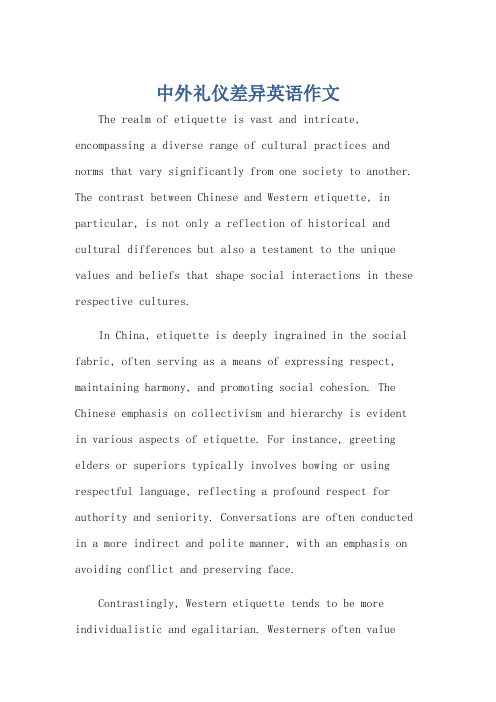
中外礼仪差异英语作文The realm of etiquette is vast and intricate, encompassing a diverse range of cultural practices and norms that vary significantly from one society to another. The contrast between Chinese and Western etiquette, in particular, is not only a reflection of historical and cultural differences but also a testament to the unique values and beliefs that shape social interactions in these respective cultures.In China, etiquette is deeply ingrained in the social fabric, often serving as a means of expressing respect, maintaining harmony, and promoting social cohesion. The Chinese emphasis on collectivism and hierarchy is evident in various aspects of etiquette. For instance, greeting elders or superiors typically involves bowing or using respectful language, reflecting a profound respect for authority and seniority. Conversations are often conducted in a more indirect and polite manner, with an emphasis on avoiding conflict and preserving face.Contrastingly, Western etiquette tends to be more individualistic and egalitarian. Westerners often valuedirectness and frankness in communication, preferring to express their opinions openly and honestly. Hierarchies, while still present in some contexts, are generally less rigid and more flexible than in Chinese society. Greetings tend to be more informal and casual, with handshakes or hugs being common forms of greeting among friends and acquaintances.Dining etiquette also exhibits significant differences between China and Western cultures. In China, dining is often a social event that involves sharing dishes and demonstrating respect for one's companions. The use of chopsticks, the order of dishes, and the placement of utensils all carry cultural significance. Western dining etiquette, on the other hand, focuses more on individual servings and the proper use of cutlery. The order of courses, the timing of eating, and even the way one holds a wine glass are all governed by strict rules.In the realm of business etiquette, China and Western countries also diverge. In China, business relationships are often built on trust and personal connections, with an emphasis on long-term relationships and mutual benefit.Meetings may involve the exchange of business cards, the offering of tea, and the observation of hierarchical seating arrangements. Western business etiquette, by contrast, tends to be more formal and structured, with a focus on efficiency and direct communication. Negotiations are often conducted in a more analytical and fact-based manner, with less emphasis on personal relationships.The differences in etiquette between China and Western countries are not just superficial; they reflect fundamental differences in values, beliefs, and social organization. Understanding these differences is crucialfor anyone engaging in cross-cultural interactions, whether in business, social settings, or any other context. By respecting and adapting to the local etiquette, one can foster stronger relationships, avoid misunderstandings, and ultimately promote cultural understanding and harmony.**中外礼仪差异**礼仪的领域广泛而复杂,涵盖了各种文化习俗和规范,这些习俗和规范在不同的社会中差异显著。
浅谈英汉礼貌用语文化差异

浅谈英汉礼貌用语文化差异礼貌是语言表达中最常用的方式,也是成功交际中不可或缺的一条准则。
在不同民族文化交往中,巨大的文化差异会导致礼貌用语在使用中存在很大的差异。
从中西方来讲,通过了解英汉礼貌用语文化差异产生的原因,将英国语言学家Leech归纳的礼貌原则与顾曰国先生分析的汉文化的礼貌特征进行对比研究,试图从礼貌原则的角度去分析英汉礼貌用语在称呼、隐私语、赞美感谢等各方面的语用差异,以便在实际交往中更好的应对这种差异,获得跨文化交际的成功。
标签:英汉文化;礼貌原则;礼貌用语;语用差异众所周知,礼貌作为人类文明的体现,反映了一个民族的文化素质和修养,在人与人的交往中,使用礼貌用语可以让人们消除防备,放下戒心,保持融洽的相处,使合作顺利进行。
礼貌不仅是一种社会现象,也是一种语言现象。
正如Leech在他的Principles of Pragmatics指出的那样,礼貌是一个相对的概念,带有明显的民族性。
每一个民族都提倡礼貌、重视礼貌。
但是不同的文化背景衡量礼貌的标准不同,因此,对礼貌现象,特别是跨文化交际中英汉两种语言所体现的礼貌现象进行比较是非常必要的。
一、英汉礼貌用语文化差异产生的原因(一)价值观念的差异价值观念作为文化的核心,不同民族的价值观念所形成的语言表达方式和行为模式是不同的。
在中国传统观念的影响下所形成的文化特点是集体价值至上,人们比较喜欢中庸之道,凡是不喜欢先出头,不愿自己显得与众不同,因此有时在遇到不好回答或者没有把握的问题时会选择沉默或者回以微笑的方式来维持自己的形象,而西方的文化特点是个人价值至上,如果对别人的问题保持沉默或者回以微笑,会被认为是严重的失礼,是不尊重别人的表现。
从中西方的教育中也可以看出这一点,中国的学生比较保守,很少有自己的观点,凡是都是喜欢跟着老师的思路走,而西方国家的孩子比较张扬,喜欢逆向思维,凡事都有自己的看法,也比较独立。
(二)风俗习惯和思维方式的差异英语问候语:“How are you?”“How are things going with you?”这些问语在很多情况下并不是真的要问别人的情况,而是一种寒暄,一种开场白,所以,只要回答“Fine,thank you”这句客套话就行了。
英国交际礼仪英文版
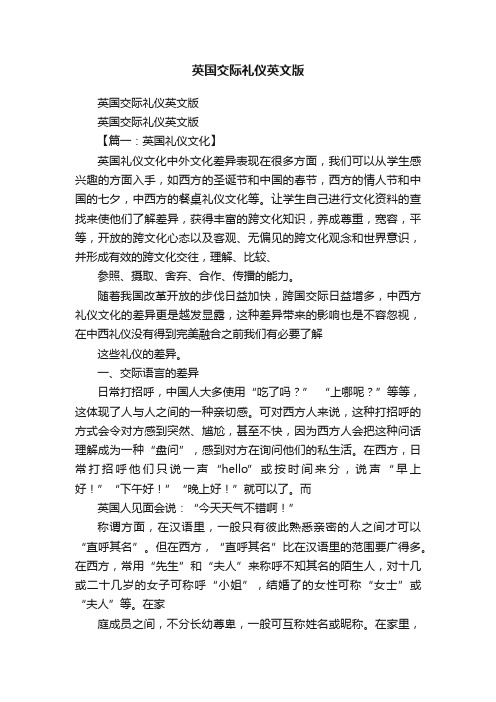
英国交际礼仪英文版英国交际礼仪英文版英国交际礼仪英文版【篇一:英国礼仪文化】英国礼仪文化中外文化差异表现在很多方面,我们可以从学生感兴趣的方面入手,如西方的圣诞节和中国的春节,西方的情人节和中国的七夕,中西方的餐桌礼仪文化等。
让学生自己进行文化资料的查找来使他们了解差异,获得丰富的跨文化知识,养成尊重,宽容,平等,开放的跨文化心态以及客观、无偏见的跨文化观念和世界意识,并形成有效的跨文化交往,理解、比较、参照、摄取、舍弃、合作、传播的能力。
随着我国改革开放的步伐日益加快,跨国交际日益增多,中西方礼仪文化的差异更是越发显露,这种差异带来的影响也是不容忽视,在中西礼仪没有得到完美融合之前我们有必要了解这些礼仪的差异。
一、交际语言的差异日常打招呼,中国人大多使用“吃了吗?” “上哪呢?”等等,这体现了人与人之间的一种亲切感。
可对西方人来说,这种打招呼的方式会令对方感到突然、尴尬,甚至不快,因为西方人会把这种问话理解成为一种“盘问”,感到对方在询问他们的私生活。
在西方,日常打招呼他们只说一声“hello”或按时间来分,说声“早上好!”“下午好!”“晚上好!”就可以了。
而英国人见面会说:“今天天气不错啊!”称谓方面,在汉语里,一般只有彼此熟悉亲密的人之间才可以“直呼其名”。
但在西方,“直呼其名”比在汉语里的范围要广得多。
在西方,常用“先生”和“夫人”来称呼不知其名的陌生人,对十几或二十几岁的女子可称呼“小姐”,结婚了的女性可称“女士”或“夫人”等。
在家庭成员之间,不分长幼尊卑,一般可互称姓名或昵称。
在家里,可以直接叫爸爸、妈妈的名字。
对所有的男性长辈都可以称“叔叔”,对所有的女性长辈都可以称“阿姨”。
这在我们中国是不行的,必须要分清楚辈分、老幼等关系,否则就会被认为不懂礼貌。
中西语言中有多种不同的告别语。
如在和病人告别时,中国人常说“多喝点开水”、“多穿点衣服”、“早点休息”之类的话,表示对病人的关怀。
但西方人绝不会说“多喝水”之类的话,因为这样说会被认为有指手画脚之嫌。
中国英国打招呼方式差异 英语作文
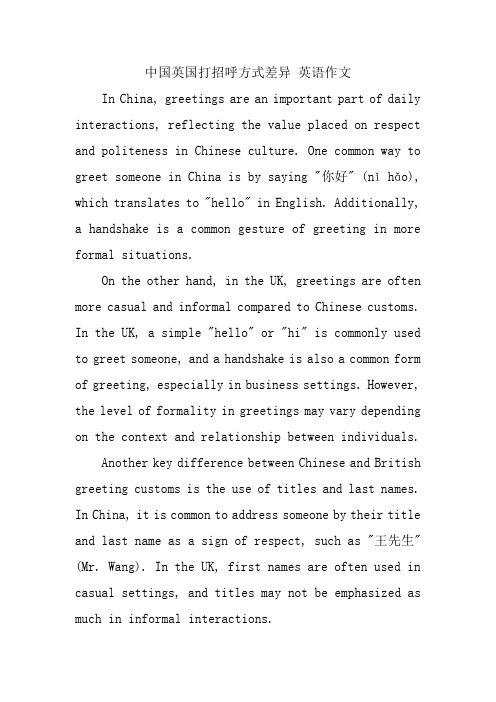
中国英国打招呼方式差异英语作文In China, greetings are an important part of daily interactions, reflecting the value placed on respect and politeness in Chinese culture. One common way to greet someone in China is by saying "你好" (nǐ hǎo), which translates to "hello" in English. Additionally, a handshake is a common gesture of greeting in more formal situations.On the other hand, in the UK, greetings are often more casual and informal compared to Chinese customs. In the UK, a simple "hello" or "hi" is commonly used to greet someone, and a handshake is also a common form of greeting, especially in business settings. However, the level of formality in greetings may vary depending on the context and relationship between individuals.Another key difference between Chinese and British greeting customs is the use of titles and last names. In China, it is common to address someone by their title and last name as a sign of respect, such as "王先生" (Mr. Wang). In the UK, first names are often used in casual settings, and titles may not be emphasized as much in informal interactions.Overall, while both China and the UK value respect and politeness in greetings, the specific customs and gestures used to greet others differ between the two cultures, reflecting the unique social norms and traditions of each country.中文翻译:在中国,问候是日常交往中重要的一部分,反映了中国文化中对尊重和礼貌的重视。
英国礼仪方面作文英文

英国礼仪方面作文英文英文:As someone who has lived in the UK for many years, I have come to appreciate the importance of etiquette and good manners in British society. Here are some key aspects of British etiquette that I have learned:1. Politeness is key: British people value politeness and good manners above all else. Saying "please" and "thank you" is essential, as is addressing people by their proper titles (such as "Mr." or "Mrs."). It's also important to be respectful and courteous to others, even if you don't necessarily agree with them.2. Punctuality matters: In the UK, being on time is considered very important. Arriving late to a meeting or appointment is seen as rude and disrespectful, so it's always best to plan ahead and make sure you arrive on time.3. Dress appropriately: British people tend to dress conservatively and modestly, especially in formal situations. It's always a good idea to err on the side of caution and dress slightly more formally than you think is necessary.4. Table manners: When eating in a formal setting, there are certain rules to follow, such as using the correct cutlery and keeping your elbows off the table. It's also considered polite to wait until everyone has been served before starting to eat.5. Queuing: British people are known for their love of queuing (lining up), and it's considered very rude to jump ahead of someone in a queue. It's also important to maintain a respectful distance from the person in front of you.中文:作为在英国居住多年的人,我已经深刻体会到在英国社会中礼仪和良好的行为举止的重要性。
本科毕业论文-汉英礼貌用语的对比研究

摘要英语与汉文化的巨大差异导致其礼貌用语的使用差异。
本文从历史渊源、语用差别、中西礼貌原则和相同的礼貌用语所产生的语用差别等来展开论述,为了能主动地、自觉地排除文化干扰,避免文化冲突,求同存异,从而保证跨文化交流的顺利进行。
关键词:英语;汉语;礼貌用语;礼貌原则;语用差异AbstractThe huge difference in English and Chinese culture led to the use of polite language differences. In this paper, from the historical origin, pragmatic differences between Chinese and Western Politeness Principle, and the same courtesy expressions generated by the pragmatic differences to discuss, in order to be active, consciously eliminate cultural barriers, to avoid cultural conflicts, seek common ground while reserving differences, so as to ensure the smooth intercultural communication.Key words: English; Chinese; politeness; politeness principle; pragmatic difference.汉英礼貌用语的对比研究一、引言礼貌是文明的象征,礼貌是社会存在的普遍现象。
礼貌用语是人们日常语言交际过程中的重要手段,礼貌用语协调着人们的社会关系和交际活动,是维系人际和谐的工具。
TheEnglishReserveandPoliteness英国人的谨慎和礼貌

TheEnglishReserveandPoliteness英国人的谨慎和礼貌第一篇:The English Reserve and Politeness 英国人的谨慎和礼貌摘自:英语泛读教程It seems to many people that the British are extremely polite and difficult to make friends with.Hopefully the following passage will help you to have a better understanding of the British character.在许多人看来,英国人极为礼貌,同他们交朋友很难。
但愿下列文字能够帮助你更好地了解英国人的性格特点。
To other Europeans, the best known quality of the British is “reserve”.A reserved person is one who does not talk very much to strangers, does not show much emotion, and seldom gets excited.It is difficult to get to know a reserved person;he never tells you anything about himself, and you may work with him for years without ever knowing where he lives, how many children he has, and what his interests are.English people tend to be like that.If they are making a journey by bus, they will do their best to find an empty seat;if by train, an empty compartment.If they have to share the compartment with a stranger, they may travel many miles without starting a conversation.If a conversation does start, personal questions like “How old are you?” or even “What is your name?” are not easily asked.Questions like “Where did you buy your watch?” or “What is your salary?” are almost impossible.Similarly, conversation in Britain is in general quiet and restrained and loud speech is considered ill-bred.对于其他欧洲人来说,英国人最著名的特点是“谨慎”。
英国和中国的礼仪英语作文
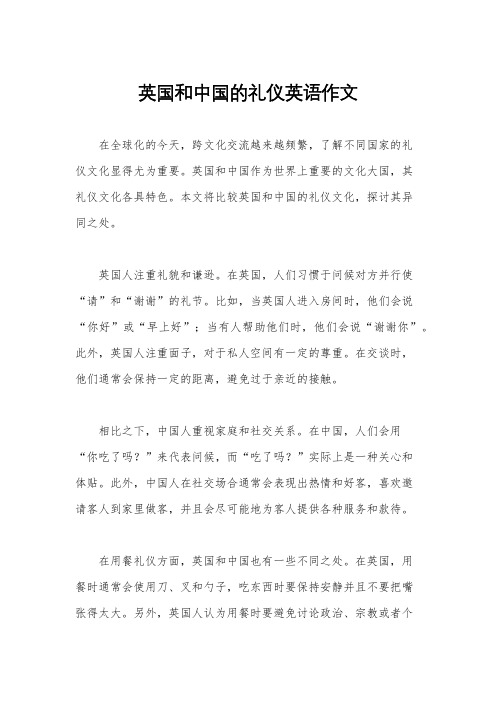
英国和中国的礼仪英语作文在全球化的今天,跨文化交流越来越频繁,了解不同国家的礼仪文化显得尤为重要。
英国和中国作为世界上重要的文化大国,其礼仪文化各具特色。
本文将比较英国和中国的礼仪文化,探讨其异同之处。
英国人注重礼貌和谦逊。
在英国,人们习惯于问候对方并行使“请”和“谢谢”的礼节。
比如,当英国人进入房间时,他们会说“你好”或“早上好”;当有人帮助他们时,他们会说“谢谢你”。
此外,英国人注重面子,对于私人空间有一定的尊重。
在交谈时,他们通常会保持一定的距离,避免过于亲近的接触。
相比之下,中国人重视家庭和社交关系。
在中国,人们会用“你吃了吗?”来代表问候,而“吃了吗?”实际上是一种关心和体贴。
此外,中国人在社交场合通常会表现出热情和好客,喜欢邀请客人到家里做客,并且会尽可能地为客人提供各种服务和款待。
在用餐礼仪方面,英国和中国也有一些不同之处。
在英国,用餐时通常会使用刀、叉和勺子,吃东西时要保持安静并且不要把嘴张得太大。
另外,英国人认为用餐时要避免讨论政治、宗教或者个人问题。
而在中国,用餐时通常使用筷子,人们习惯于共享食物,并且会在饭桌上进行一些轻松的谈话,增进感情。
在商务场合,英国和中国也有一些不同之处。
在英国,商务谈判通常比较正式,双方都会遵循一定的程序和规范。
而在中国,人们更加重视人际关系,商务谈判往往会在社交活动中进行,建立良好的人际关系被认为比签订合同更为重要。
综上所述,英国和中国的礼仪文化各具特色,在跨文化交流中了解并尊重对方的礼仪习惯至关重要。
只有通过相互尊重和理解,才能建立起良好的合作关系,推动文化交流的深入发展。
- 1、下载文档前请自行甄别文档内容的完整性,平台不提供额外的编辑、内容补充、找答案等附加服务。
- 2、"仅部分预览"的文档,不可在线预览部分如存在完整性等问题,可反馈申请退款(可完整预览的文档不适用该条件!)。
- 3、如文档侵犯您的权益,请联系客服反馈,我们会尽快为您处理(人工客服工作时间:9:00-18:30)。
浅谈从英国人言行规则理解和区别某些英语表达法【摘要】与外国人,尤其是与英国人的交往并非想象般简单,看似随意的表达往往会遭致不解,愤怒或敌意。
在本文中,作者将从人类学角度,浅谈英国人的某些言行规则与衍生出的英语表达法,着重简单的天气、打招呼、请和感谢表达,目的是体察英国文化和英国人的性格特点,纠正以往我们耳熟能详的表达法,增进对于英国人的理解认识。
【关键词】言行规则;天气;打招呼;请;感谢
【中图分类号】g64 【文献标识码】a 【文章编号】
2095-3089(2013)4-00-01
还记得我们在小学或初中初次接触英语对话时,启蒙教师总会介绍一些常用表达法。
比如,他们会经常提醒我们,与外国人开始对话时,最好的方法是谈天气,“beautiful day,isn’t it?”,“terrible weather,don’t you think so?”,“it sure is cold day,isn’t it?”;与他们打招呼时,除了“how are you?”,为了表示亲近友好,可以主动自我介绍,如“my name is…”;要求别人帮忙,要说声“please”,接受别的帮助或赞美,要说声“thanks”。
这些规则看似简单,我们也已然熟记在心,并未深究,但细细品味,仔细琢磨后,其中还会有未解之处。
外国人,尤其是英国人为什么会经常谈“天”?简单的打招呼是不是每时每刻都适用,别人也会欣然接受?“请”和“谢谢”又体现了英国文化的什么特征呢?要解答这些问题,必须要分析英国人的言行规则,从最
根本的角度理解和区别某些英语表达法。
笔者先要解释一下选取英国人作为研究对象的原因。
诚然,美国是当今世界头号超级大国,美国人也喜欢旅游,行走天下,因此我们身边接触的人多是他们。
但是正如英国大文豪萧伯纳所言,英国和美国是被同一种语言区分开来的两个国家。
而今,这种跨大西洋语言差异还在不断被拉大。
英式英语和美式英语表达法的区别体现在各个方面,如逛遍英国的最佳交通方式是乘坐地铁,英国人叫“underground”,有时也把这套轨道网络称作“tube”。
美国则管地铁叫“subway”,这个词在英国人那里指的是过街地下通道;在英国,跟汉堡包在一块的词语“chips”,构成了薯条,而不是美国人说的“fries”,要是薯片呢?英国是“crisp”,美国则是“potato chips”;甚至一些不起眼的词汇单复数上也有差别,英国对于运动“sport”一词,使用的是单数,而美国人则喜欢用复数“sports”,体育馆的看台“stand”则正相反,英国人使用复数“stands”,美国人变成了单数。
但是真正能体现英语文化根本特征和言行规则的还是英式英语,因为英国的历史要比美国长,英国的文化积淀要比美国浓厚的多。
在温斯顿·丘吉尔的巨著《英语民族史》中,他对英式英语的形成做了很好的阐述:由于英国(确切的应该说是英格兰)曾被多个民族,如罗马人、日耳曼人、北欧海盗、诺曼底人所征服和统治过,所以它的语言融汇了多个语种的特点,又自成一派。
美式英语多是对英式英语的再发展,也随着美国人的性格,自由散漫了一些,而这被正统的英国人所不齿。
bbc杂志曾发表了一篇关
于美式英语入侵英国的文章,引起了很多英国人的共鸣。
读者纷纷发来电子邮件,说出了最困扰自己、最让自己恼火的美式英语,表达不满。
因此,为回归英语根本传统,笔者将从英国的言行规则分析英语表达法。
英国人为什么喜欢谈天气或者用天气作为打招呼的方式?我们知道,中国人喜欢见面打招呼喜欢用“吃了吗?”,这是因为在很早之前,中国绝大多数的地方十分贫穷,人民生活艰难,很多人食不果腹,衣不遮体。
那时候,人们想的是能不能有饭吃,人与人之间最关心的也是能否吃上饭,他们认为现世的一切好处都取决于吃饭。
以此类推,很多专家,甚至包括英国专家都认为英国人谈天气是因为英国天气确实多变。
杰里米·帕克斯曼(jeremy paxman)认为英国天气有着内在的趣味:“英国人对天气的执着一点儿不含戏剧因素,人们对天气现象的不确定性很感兴趣……英国的天气可能没有暴风,但是,由于其大洋边缘与大陆边缘的双重地理位置,英国的天气绝对不是你能预测的。
”然而,笔者经过研究发现,帕克斯曼其实是错了。
英国人的聊“天”并非对天气本身有多关注,它只是用来克服他们天生的保守和羞涩的性格,拉近谈话人彼此的距离。
就像凯特·福克斯(kate fox)所述,英式聊“天”只是一种“载体”,就像灵长类动物能够梳理毛发一样,我们人类也需要此类亲昵载体。
当然,不是梳理毛发,而是相互建立起某种联系,减少心理距离。
以笔者长期与英国人的交往,非常赞同凯特的观点。
英国人性格的保守和羞涩有时到了另人费解的程度。
这涉及到另一
种打招呼方式,自我介绍是我们耳熟能详的方式,但是在英国人身上则不灵光。
在英国人面前,切记不要急于自我介绍。
一旦如此,他们会皱起眉头,怪怪的看着你,仿佛异物。
经询问后方发现,英国人没有自我介绍的习惯(他们认为这是美国人太随便的方式),因为谈话双方彼此还没有建立信任。
因此,英国人会选择别的打招呼的方式(如天气)或话题,直到最后,他们会自己主动选择是否用“by the way,my name is…”来建立和加强对你的信任关系。
另外一个让人忽视的言行规则和表达法是“请”和“谢谢”的使用。
在英国的酒吧点酒和商场购物时,一定要使用“请”,如果忽略了,会被看成大逆不道。
拿到酒或拿到找回的零钱时,一定要说句“谢谢您”。
英国人在每次请求或获得帮助时,都会不厌其烦的说“请”和“谢谢”。
因为英国是一个对阶级高度敏感的社会,礼物用语也体现了英国文化在很多方面非常平等。
服务行业虽然大多属于下层阶级,但是在这些服务的态度中,有明显的绝不卑躬屈膝的成分,“请”和“谢谢”的使用要求人民用礼物和尊敬来对待他们。
热播美剧《唐顿庄园》中的管家的举手投足给了我们很好的诠释,就像其它规则一样,这项规则被违反时,周围的人便会投来异样的眼光,对此皱起眉头。
在与英国人的交往中,“谢谢”的表达有些特殊,“thank you”最常见,但如果你使用了“gratitude”,英国人会抱以赞许和敬佩的目光,因为后者有感激之意,是古时英国上流社会的用语,也最地道,最英国。
综上所述,在与外国人,尤其是英国人的交往中,并非如我们
想象般简单。
看似随意的表达往往会遭来不解,甚至是愤怒或敌意。
打招呼和开始对话以及表达感谢之意,只是其中最简单和常用的,更别说英国人还有其它如衣着、饮食、住宅、工作等接触规则。
要想真正与英国人友好往来,就要深度体察英国的文化以及英国人的性格特征,多从人类学的角度理解和区别所有规则,做到有的放矢,切不要盲目学习和跟从。
参考文献
[1]collyer, peter:rain later, good, bradford on avon,tomas reed, 2002
[2]gorer, geoffrey: exploring english character,london, cresset press, 1955.
[3] kate fox: watching the english: the hidden rules of english behaviour, nicholas brealey publishing, 2008。
